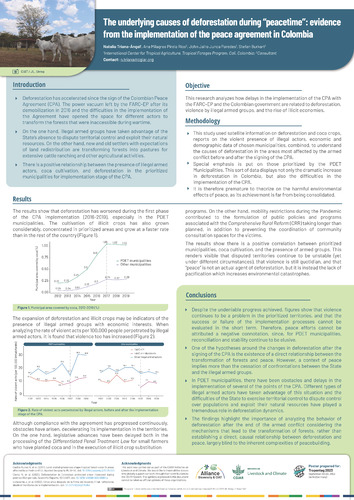The underlying causes of deforestation during “peacetime”: Evidence from the implementation of the peace agreement in Colombia
The acceleration of deforestation is one of the unexpected consequences of the signing of the Peace Agreement between the Colombian government and the FARC-EP guerrilla in 2016. In recent years, deforested areas have increased in territories previously occupied by guerrilla and paramilitary groups, while illicit crops have expanded, and the violence perpetrated by other illegal armed groups has intensified. This research seeks to understand the relationship between the implementation of the Peace Agreement and deforestation in Colombia, mainly through a quantitative approach. Satellite data on tree cover, land cover, and coca cultivation, were combined with data on violence rates to understand the factors behind increasing deforestation in territories affected by conflict. These results were put in relation with the Final Report of the Colombian Truth Commission, which further elaborates on the reasons why peace and stabilisation remain elusive in Colombia, even after FARC-EP demobilisation. Impoverished territories historically neglected by the Colombian state, nuclei of confrontation and instability, are still suffering the ambivalences of war and the struggle over natural resources, mostly due the delays in the implementation of the Agreement. We found a positive relationship between the presence of illegal armed actors, coca cultivation, and deforestation in the areas most strongly affected by conflict, all during the implementation stage of the Peace Agreement between 2016 and 2019. The results indicate that, for these municipalities, armed conflict did not end in 2016, but rather transformed into a violent, tangible struggle with other protagonists, challenges, and disputes over land tenure and land use.

